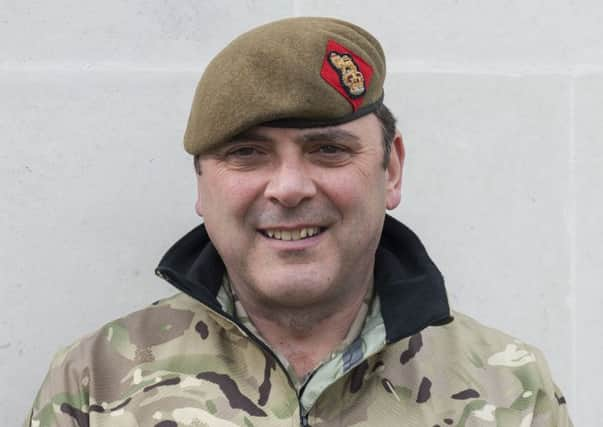New brigadier for Duke of Lancaster’s Regiment


With decreasing numbers and changing roles, these are challenging times.
But with more than 20 years of military experience under his belt, Brig Rafferty is optimistic about the future of the regiment which has earned itself a reputation of the lions of the army.
Advertisement
Hide AdAdvertisement
Hide AdBrig Rafferty, who was appointed into the ceremonial role this week as the head of the regimental family.
This not only includes the two regular and one reserve battalion, but the wider regimental family of cadets and veterans.
Brig Rafferty has seen active service in Iraq and Afghanistan as well as Northern Ireland, London and the Falkland Islands.
For now the Duke of Lancaster Regiment and 4th Battalion Duke of Lancaster’s Regiment are on home turf and here to stay, for a few years at least.
Advertisement
Hide AdAdvertisement
Hide AdRecent years have seen the regiment serving tours of duty in war zones such Afghanistan and Iraq but with no tours planned before 2016 the new Colonel of the Regiment, Brigadier Peter Rafferty says he will be strengthening the army’s links to the region.
Brig Rafferty has only been in the post for a matter of days but as a serving soldier he sees a bright future for the North West’s regiments.
For the next five years, he will be charged with overseeing the health of the Duke of Lancaster’s Regiment and with the troops at home he says now is the time to really put down roots.
“We are looking forward to the opportunity to bring all the regimental family together in a way we have not been able to recently because of our commitments in Iraq and Afghanistan.
Advertisement
Hide AdAdvertisement
Hide Ad“Our main focus will be to ensure we offer exciting careers to the best of the North West’s young people.
“We are very optimistic - we have established a strong reputation for professionalism. We are strong on the battlefield and have achieved a reputation that is second to none as the lions of the regiment.”
With major restructuring of the armed forces underway, Brigadier Rafferty is taking to the role at a time of great challenges. The Army Reserves - formerly known about the Territorial Army - will be reducing in numbers but increasing in responsibilities to bring their duties closer to those of the regimental troops.
Unlike full-time soldiers, reserves also have civilian jobs but Brig Rafferty says the future army will see a greater blend of reserves and full-time soldiers.
Advertisement
Hide AdAdvertisement
Hide AdHe says: “Many of our reserves have already served with the regimental soldiers in conflict including Iraq and Afghanistan.
“There is very little difference between their roles. If you ask a kinsman of his experiences of our reserves in Afghanistan, they will ask ‘how can you tell the difference?’
“We bring the reserves up top the same standard as our regimental soldiers but where the regimental soldier juggles their career and family, the reserve juggles his career in the army, his career of civvy street and his family life.”
And stepping into marching boots from a role on civvy street is something newly-appointed Honorary Colonel Jeremy Gorrick is learning fast.
Advertisement
Hide AdAdvertisement
Hide AdUnlike Brig Rafferty, Hon Col Gorrick has no military experience, having been a successful Preston businessman and High Sherriff of Lancashire - a role which brought him into contact with the army.
He explains; “I am linked in wit the 4th Battalion. Honorary colonels are military roles but many come from other spheres of experience, because the army has a different requirement.
“A lot of the challenges we face relate to people leaving teh army and having to try and seek out employment in a world that is very different from where they have come from.
“Families are coming back who have only ever lived in army accommodation.
Advertisement
Hide AdAdvertisement
Hide Ad“There is also a business perspective because a regiment is a bit like a small business.”
Col Gorrick admits he is on a steep learning curve, but one he is thoroughly embracing.
He says: “I will be doing some foot drill training so I know how to march and I am learning about the customs and traditions of the regiment.”